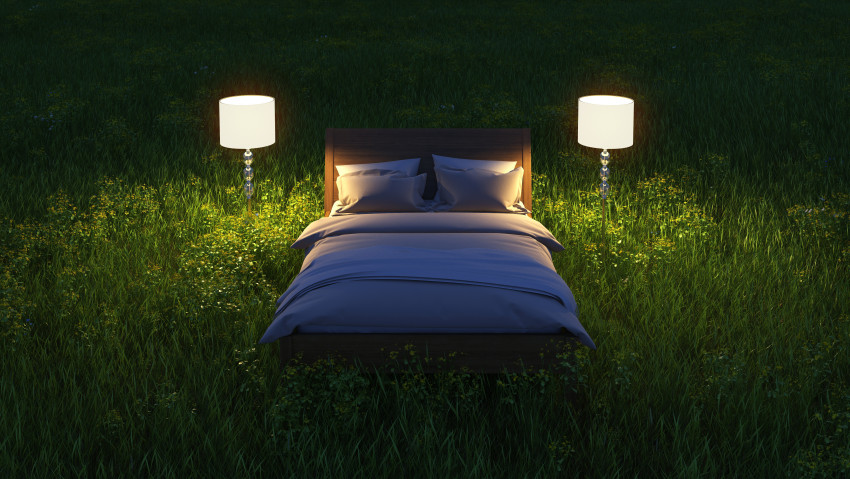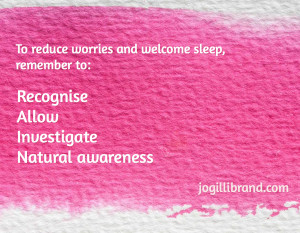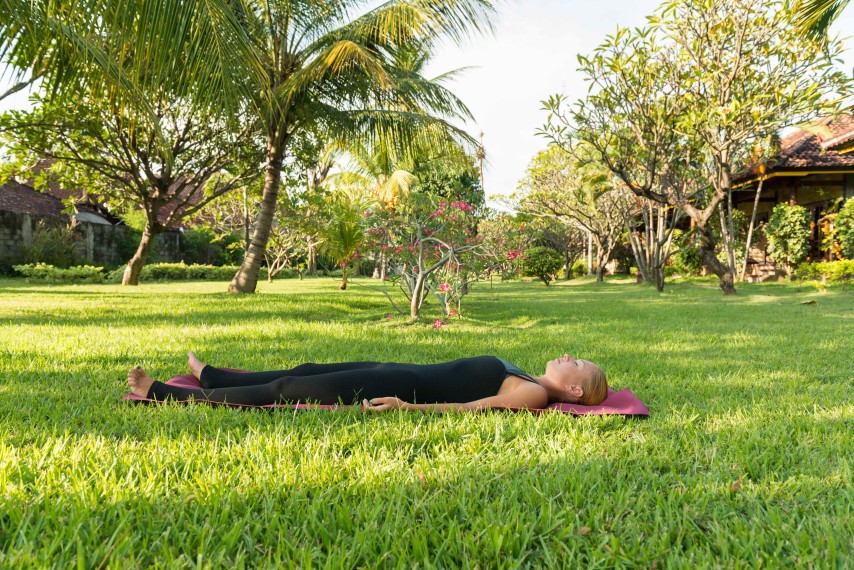Sleep is natural; your body and mind know how to do it without trying. So why can it be hard to come by sometimes? If you find it difficult to drop off into a good night’s sleep then something is clearly blocking this natural process, and our mission is clear: work out what the block is and minimise it or eliminate it.
Good quality sleep is usually the first casualty of stress
When I started teaching yoga one of the unexpected delights was seeing how much people relaxed and got a better night’s sleep after a yoga class. I was so happy when Eric, one of my first students, said “although I wasn’t really aware of it at the time, I must have relaxed at a very deep level, because that night I had the best sleep in many years.” In fact, the desire for better sleep is one of the top reasons that people turn to yoga, and supports the view that we’re living in a sleep-deprived culture.
I usually sleep really well, but when I remember times when my sleep has been short or disturbed, it’s been because I was worried. My mind has whirred in the the dead of night over things like keeping a not-for-profit company going amidst grant cuts knowing this was my colleagues’ livelihood; worries about my Mum’s health; having a mile-long list of work tasks and knowing that even if I could spend 24 hours every day for a month on them I wouldn’t be able to tick them all off. I’m going to hazard a guess that you can relate to one or more of these. And you’ll have your own worry-tales too, perhaps about children, bereavement, divorce, money, lifestyle change such as moving to a new house or another country. The list could be endless.
But these are all situational insomnias: when the situation changes, sleep comes more easily. On the other hand, perhaps you feel you have unrelenting insomnia and are without hope that it could ever change.
Whatever your circumstance, when you need sleep you can’t ignore it and you can’t leave it to chance. After all, you’ve got so much to accomplish in your life that you need good, reliable sleep as a key health foundation. Here are a few places to start, if you
- just need to relax NOW then sign up for ‘7 Secrets to Sleeping without Stressing’ and download the relaxation audio (you’ll get instant access)
- want to build a reliable routine that almost inevitably leads to sleep no matter the circumstances (great for shift-workers and travellers), read this later
- feel tired or drained all the time but still can’t sleep, read this later
- have worries that are keeping you awake, read on …
Use over-thinking to your advantage
Assuming you’ve been able to rule out medical reasons for not sleeping, then it’s time to investigate the thoughts that are keeping you awake. You’ve probably heard the advice to write down your concerns, and this is a great place to start but it could keep things at the surface level and maintain the status quo. A useful approach for getting to the heart of the matter is the RAIN acronym used in mindfulness. Here’s an outline of how you could make use of it:
Recognise what thoughts, physical sensations, emotions and behaviours are keeping you awake. Whatever’s keeping you from the Land of Nod, write it down, say it out loud to yourself, or share it with someone you trust. Be as specific as you can about what exactly is dragging your attention away from sleep. People using RAIN often find that this process of recognising and naming is less scary than imagined, and often more transformative than trying to drive away the problem or ignoring it. It’s important to be kind to yourself as you recognise what’s here for you now. This is about taking care of yourself, setting aside any blame, judgement or criticism of yourself or others, and you’re invited to approach this with the same kindness and gentleness that you would if you were supporting a beloved friend.
Allow whatever’s worrying you to just to be here for now, without self-critical judgement, demanding it should be another way, or distracting yourself. Rather than denying, resisting, criticising or pushing worries away, allowing them to be present can help them change in nature or dissolve. To allow things to be present is to take a pause, perhaps softening the body and mind with some breathing focussed at the navel. It’s in the gap we create between a familiar trigger and an automatic response that some peace and possibility is found.
Investigate what’s presenting itself, and do so with kindness for yourself and others. For example, if you’ve recognised that worries about money are keeping you awake and you’ve allowed all the associated feelings and thoughts to be present, then it’s time to investigate what this really feels like in your body (a constriction at the chest, an agitation which makes lying still impossible, or something else?). The investigation can then proceed to the thoughts about yourself in relation to money. Are you saying you should be able to handle this sort of things, or you shouldn’t have got into this position, or something else? It’s often the stories we tell ourselves about the situation rather than the facts that keep us awake. Maintain that sense of kindness in your investigation, remembering that just as you would offer a gentle demeanour and supportive words to a friend, you now have the opportunity to do so for yourself.
Natural awareness is the attitude that opens out from the self-compassion most often generated by kindly investigation. As you become aware of this sense of compassion for yourself in this situation, a shift may occur so that the tension that is keeping you awake softens into the beginning of sleep, which you can then allow yourself to sink into with gratitude.
(The RAIN acronym is multi-purpose and can be applied to other situations that are causing difficulty. If you’d like to explore it further, come back later to this article by Tara Brach.)
Kindness not compulsion
If you try to force yourself to sleep, or berate yourself for not being able to sleep, that’s always going to be self-defeating. Being kind to yourself as you try to resolve your sleep worries is key. And part of this kindness is having the determination to prioritise sleep and create the conditions that allow it to come about naturally for you. Doing this with self-compassion, will ultimately help you enjoy life more and even achieve more every single day.
Questions for you
Have you tried this RAIN approach or will you try it? Within this context of self-compassion, what else have you tried that’s worked for you? Please share below so that we can all benefit from your explorations.
Want to explore more?
Next, I’ll help you design your own perfect sleep strategy, and find out why your daily activities may be exhausting you but not in the ‘right’ way.
Sign up for ‘7 Secrets to Sleeping without Stressing’ mini-course delivered via email and to include exclusive offers.






Join the conversation